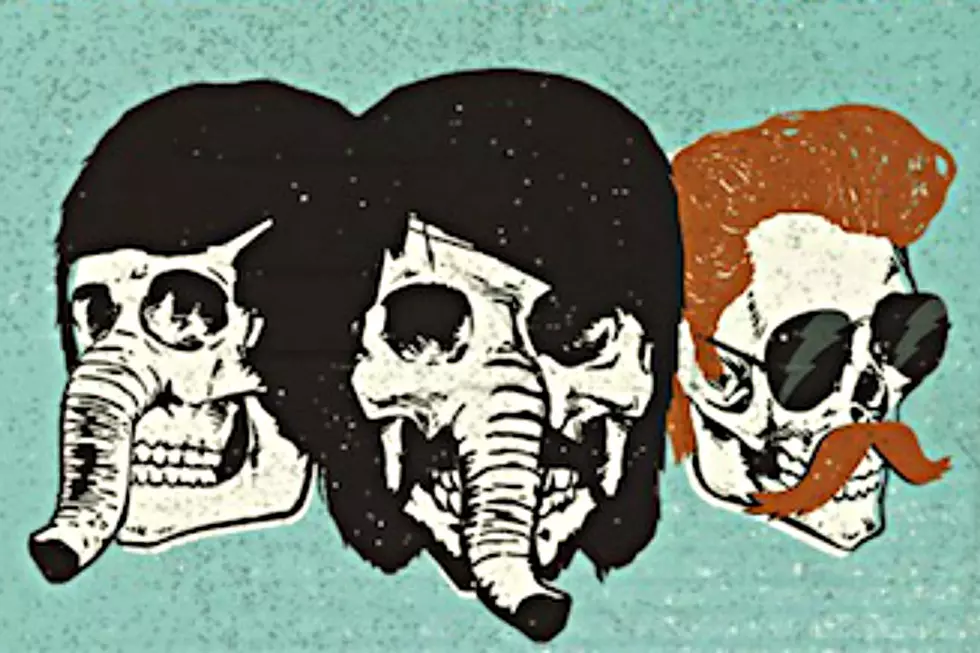
Exclusive: Death From Above 1979’s Sebastien Grainger on the Duo’s Reunion
Few bands have the rabid fan base that dance-punk duo Death From Above 1979 possess. Perhaps because the group suddenly split in 2006 after releasing just one full-length album, 2004's stellar 'You're a Woman, I'm a Machine,' that helped them gain such a cult following. Touring with Nine Inch Nails probably didn't hurt either. Luckily for DFA fans, singer/drummer Sebastien Grainger (above right) and bassist Jesse Keeler unexpectedly reunited in 2011 and released a new album, 'The Physical World,' this past September. We caught up with Grainger during the duo's recent tour to talk about the reunion, the new record, fans' expectations and more.
Did the process of creating another Death From Above 1979 record evolve or were you just picking up from where you left off?
It was only a break for us working together. We both made a million things in the interim, so our approach to recording had changed. When we made the first record, I never touched a recording console. I had no idea what it was and I had no interest in gear and things. And in the years between, I made two records on my own and I made records with other people and produced, so I got more knowledge and experience. I wrote maybe a dozen songs before the first Death From Above record and, in the time in between, I probably wrote about 100 or 200 songs. So that experience maybe shows.
Are some of those songs not even recorded yet?
Absolutely. (I have) lyrics and melodies and, you know, little orphan verses and choruses on hard drives and cassettes.
Obviously you have a busy schedule with DFA and your own work. Is it tough to find time to add meat to those unfinished songs?
Yeah. I just consider tour stasis a little bit. I don't try to force anything out. Sometimes the shows are all you can do. That's the only energy you have, but it's only a fraction of our time. You dedicate a couple of months now and then and work on some time off back and forth so it's not a big deal. I've found time to write a couple of songs since we've been on the road.
You've said that 'The Physical World' gives you the freedom to play the shows that you want to play and do the things you want to do. Was that not the case with 'You're a Woman, I'm a Machine'?
'You're A Woman, I'm a Machine' was the whole ascension aspect that was difficult to perceive from where we were standing. It's only a big record, or however you consider it, in retrospect. At the time, we made this thing and then we worked our asses off touring it. We didn't see it as this important document or the way it's regarded now by fans. It was just so normal to us.
I think that the idea this time is to kind of honor the band in a way and honor the energy that surrounds the band. It's not something to take for granted -- like filling a room full of people that want to be there, singing along and going bananas. That's a special thing that not everyone gets. I have fun touring with my solo band, but that's the reaction I get. It's a special thing that I don't want to take for granted.
That's not what our experience was with the other record. The experience with the other record was that we were piecing our audience together one show at a time. That was the traditional rock 'n' roll trajectory where you go to a city and there are 10 people, then you go back and there are 20, then you go back and there are 40. That's what we were doing, so we never reaped the rewards of that sort of high-energy audience. I mean, we did have it in sort of a punk-rock way, but it wasn't like this. It's just cool to be able to play music for people.
You guys have been performing an acoustic version of 'White is Red' from 'The Physical World.' Was stripping it down difficult?
Basically, radio stations want us to go play there all the time and ask us to do that kind of thing. Every time we've tried to do that in the past, it wasn't successful. We always feel like it doesn't sound good. You spend so much time working on a record and then a radio station wants you to try and replicate that. It's not going to be a live show and it's not going to sound like the record. It's this thing in between that I never found very exciting.
It's also so much work to do. We've got people who work for us and it's basically doing a free show for the radio station. We have to pay our guys out of pocket to do that. It's this weird logistic nightmare. So we're like, "How can we appease the radio stations and how can we perform in a way that's easier and it's not trying to do what we do live?" Also, I wanted to be able to show the songs just in song form without the all the bells and whistles, and without the shtick of the punishing, loud two-man band. The songs get -- in a good way -- lost in the performance and melee of a live show, as they should. I wanted to be able to show that we're writing songs that have ideas and melodies. The idea was just to see what a desperate love song is like when you don't do it that way.
Is it harder to deconstruct and strip down a song from its original studio form than to write an acoustic song?
When Death From Above first started, I was recording acoustic guitar music -- just guitar and a drum machine, or something, recording in my bedroom where Jesse and I lived. The idea to start this band was based on his desire to make weird, loud music, and then him going, "Oh, this guy makes cool songs and he can sing." That was the birth of this band: my little acoustic guitar recordings and his proclivity for crazy punk-rock music.
What are the differences between now and when you guys split back in 2006?
I think the biggest difference between now and then was that there were a lot of problems with the band (back then). There wasn't just the rigors of touring, but I think that the ascent was hard to deal with. We both dealt with it in different ways and (for us both, it) involved turning away from the band. I got more anti-social and Jesse got more social. It pushed us into the extremes of our personalities. We turned away from one another.
This time, we see eye-to-eye mostly. If I'm having a bad day or if we have a bad show, we talk about it together. We don't turn to other people. He doesn't go wherever he went or I don't go wherever I went. We come together and go, "F--k, that was hard," or, "It was a good show. F--k, that was awesome!"
It's hard to try to relate the joys and frustrations of this lifestyle with anyone not involved with it. If I try to explain the difficulties of being in a band to my folks, it sounds just like, "Those aren't real problems." Because of the polarity of the lifestyle, the extreme highs of a show and then the lows of showering in the crummiest showers in the lineup of eight men who need to shower, that's what creates the weirdness and kind of the absurdity of the whole thing. To have someone you can relate to in that absurdity is very helpful.
More From Diffuser.fm









